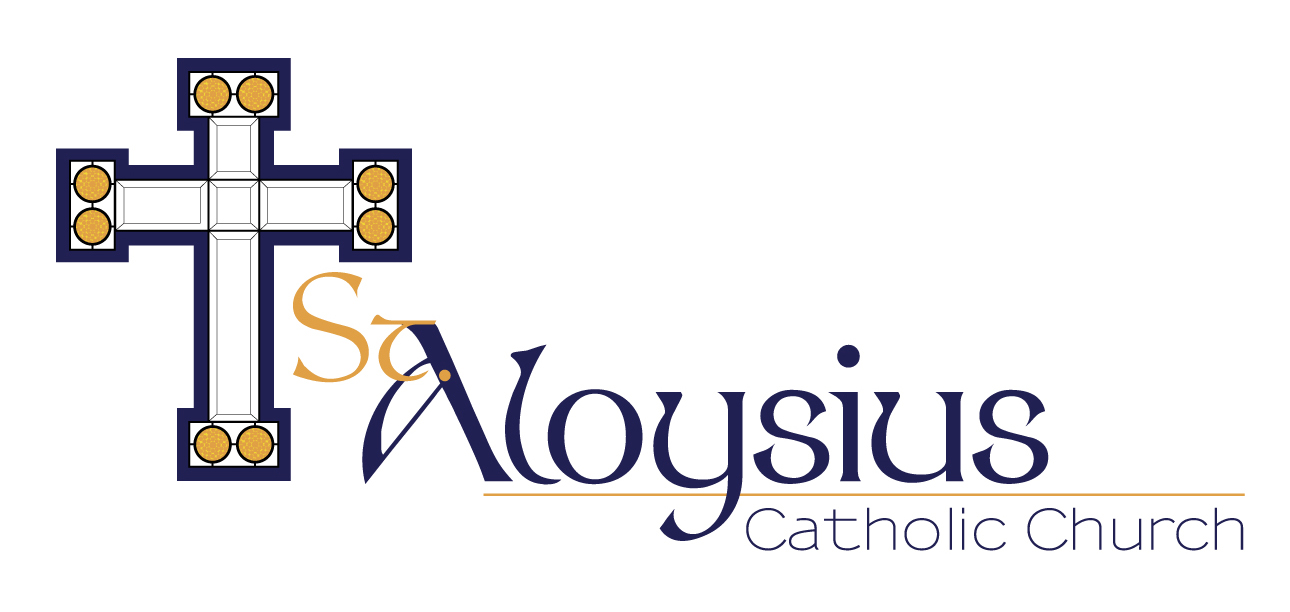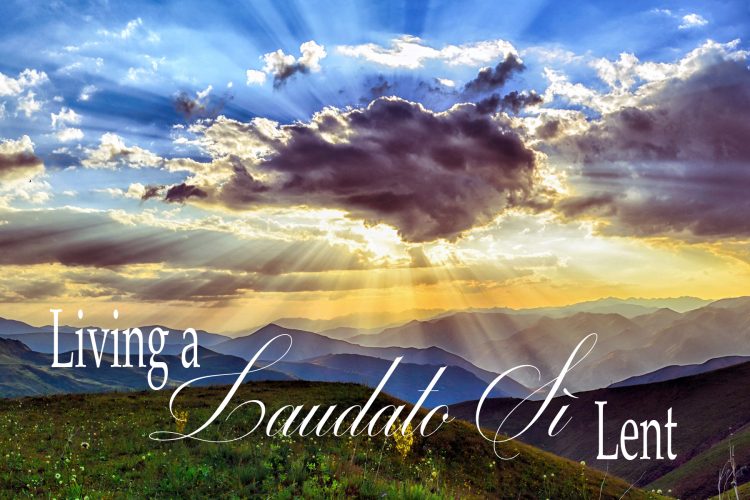
“Living our vocation to be protectors of God’s handiwork is essential to a life of virtue; it is not an optional or a secondary aspect of our Christian experience.” (Laudato Sí, 217)
The Life and Justice Committee is inviting all of us to experience Living a Laudato Sì Lent. As we begin our journey as individuals, families and a parish in “Caring for our Common Home,” the group will introduce a theme each week for the six weeks of Lent to help us explore and strengthen our understanding of Pope Francis’s message.
Each week will be structured in a three-action format — Prayer, Fasting and Almsgiving — to help us think and act in simple but meaningful ways to Care for Creation and deepen our Lenten Journey.
PRAY/LEARN: This section will contain a brief introduction to each theme and provide resources and links to learn more about an issue as we pray for the daily concerns of our human family.
FAST/CHANGE: This section will provide suggestions for alternatives to the traditional act of “Giving Up” something and encourage us to change an attitude or make a new habit of caring.
GIVE/VOLUNTEER: This is where you can put your Faith into Action with suggestions on relevant charities or local organizations to consider supporting with your time or money.
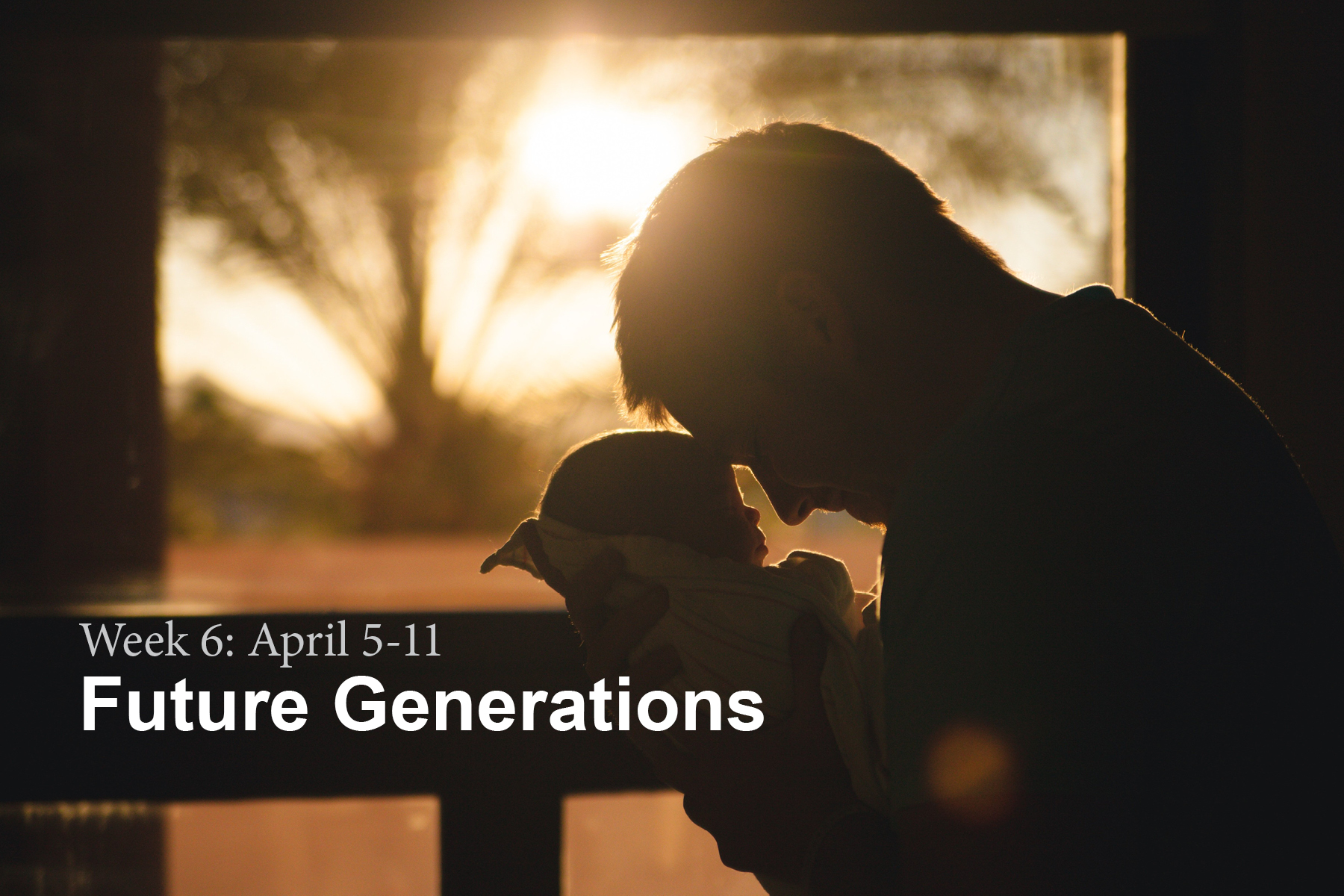
“Once we start to think about the world we are leaving behind to future generations, we look at things differently; we realize the world is a gift which we have freely received and must share with others.” (Laudato Si, 159)
In Laudato Sì, Pope Francis shows us that all of creation is a gift, given to us by God, for his glory. All of his creation – including air, water, plants and food, animals and their habitats – are given not just to us, but to all of humanity. As human beings we are responsible for taking care of his creation and each other. When we think of the common good, in light of an integral ecology, we have to consider all generations that will come after us. “Intergenerational solidarity is not optional,” Pope Francis reminds us, “but rather a basic question of justice, since the world also belongs to those who will follow us (LS 237).”
When we find ourselves unable to think seriously about future generations, we also find it difficult to think beyond our present, individual, interests and about the needs and welfare of the excluded and marginalized. Our actions in the present affect all living beings, even in the future.
In order to ensure future generations can flourish, we need to develop an ecological education and spirituality suited to the task. We must seek to change our lifestyles and educate one another about the covenant between humanity and the environment. Most of all, Christians need an ongoing conversion, an “ecological conversion whereby the effects of their encounter with Jesus Christ become evident in their relationship with the world around them (LS 217).” For the conversion to affect future generations, it must be a communal conversion as well as individual.
Pray/Learn
In praying to the Holy Trinity, the infinite community of love, we can learn to see ourselves in communion with God and others. Pray a Litany to the Trinity, the Creator.
Pray with Genesis 1:24-30 and see what God may tell you in prayer about being a good steward of the resources that He has put in your possession or has given you access to.
Fast/Change
In Laudato Sì, Pope Francis writes that “Sunday, like the Jewish Sabbath, is meant to be a day which heals our relationships with God, with ourselves, with others, and with the world.” Consider ways of making the sabbath a day of contemplative rest. Can you integrate more silence into the day? Abstain from buying things?
Consider whether there are ways you can help promote ecological education – in your family, parish, workplace, or community.
Give/Volunteer
Planting trees or donating to a reforestation project will benefit future generations. One Tree Planted is a nonprofit that plants trees all over the world.
Find out about actions and events related to Laudato Sì happening around the world. Laudato Sì Week is one of these.
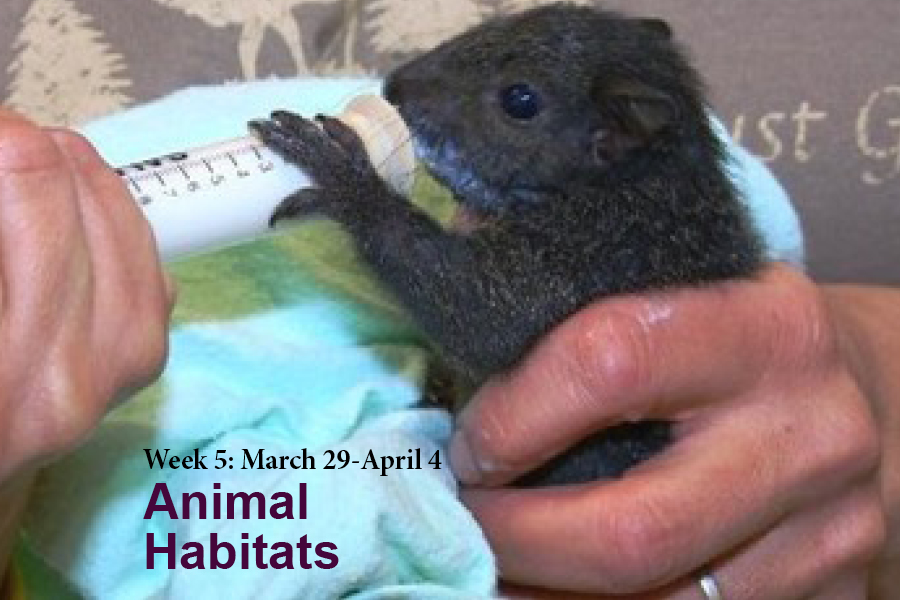
“Creatures are not just resources but have value in and of themselves and give glory to God.’’ (Laudato Si, 33)
On the sixth day…sharing the wild.
After the sixth day, after God had created all the wild things – all the plants and animals of Earth, God told the man and woman they had dominion over them all. God saw that it was very good. Many believe that mankind was to go out and subdue the wild. But to have dominion means more. It means we are given a gift and we are meant to take care of that gift and cherish it. God saw that it was very good as he created it. We are called to preserve the natural world as God’s gift to us all.
The reality is that we bend the natural world to our needs. We see the wild places only in terms of what value they bring to us. What is truly wild and natural has been reduced to a small percentage of the world land mass and the ecosystems of our oceans and water ways are challenged as well.
Check out this USDA sponsored website that details how land is used in the United States. There are many articles, charts, and references. You might be surprised.
Pray/Learn
Study the charts and information at the above website.
Check out these organizations considered among the most effective at saving the natural environment worldwide:
- Environmental Defense Fund
- The Nature Conservancy
- Natural Resources Defense Council
- American Rivershttps://www.americanrivers.org/
- Black Swamp Conservancy (local)
- Sierra Club Foundation
Say the following prayer from the Thoughts About God website: Loving Father and Creator of all, we come to you today deeply grateful for your creation. As we look around us, we are amazed at the greatness and majesty of all that you have made. Nature around us speaks of your greatness – the vast expanse of the sky, the mountains, trees, lakes and streams speak of your great design. You have given us such beauty in the colors of the rainbow, the beauty of flowers and fields and the wild creatures. Words cannot adequately express the magnificence of all you have created. We join in praise with the writer of the psalms when he says, “O Lord, our Lord, how majestic is your name in all the earth.” May we show our love and reverence to you, our Lord, by caring for all that you have created. We humbly give you praise and thanks. Amen.
Fast/Change
Visit one of the Wood County Parks. They are striving to return the land to its natural state by reintroducing native species. Enjoy the beauty.
Check out Simpson Park and St. John’s Preserve on Wintergarden Road in Bowling Green.
Talk with local farmers about their efforts to maintain wood lots and fence rows and protect their land through conservation easements with the local land trust, Black Swamp Conservancy.
Plant native species around your home and in your gardens to attract pollinator species such as butterflies and native bees. Use environmentally safe practices in caring for your lawn and garden. Check with Wood county extension office for advice.
Give/Volunteer
Donate to one of the organizations in this article in support of their mission.
Become a Master Gardener and learn about practical actions you can do to maintain the land.
Become an Ohio Certified Volunteer Naturalist
Be a volunteer at Nature’s Nursery, a wildlife conservation and rescue facility in Lucas County.
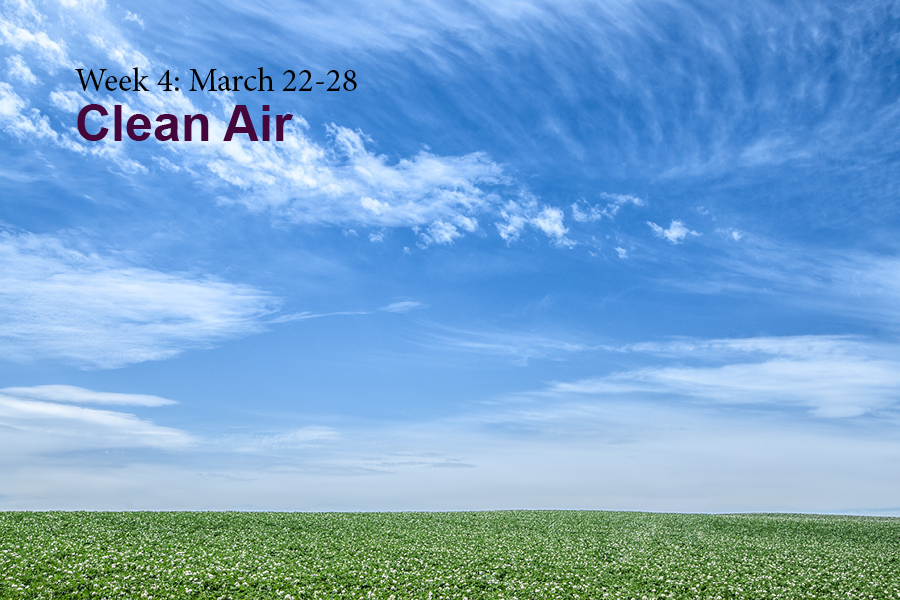
“We have forgotten that we ourselves are dust of the earth (cf. Gen 2:7); our very bodies are made up of her elements, we breathe her air and we receive life and refreshment from her waters.” (LS Preface)
In the United States we have a federal law, the “Clean Air Act passed in 1970 which regulates all air pollution sources. The Act has been amended and reauthorized several times as we made progress on this critical public health issue. The World Health Organization estimates that 3 million people worldwide die prematurely from poor air quality. Many of these victims did not live in the developed countries that emit the majority of air pollutants.
Increasing air pollution from mining, refining and manufacturing processes has been a human health concern in our country since the 19th century, when we began evolving to a more industrial economy. Today the largest emissions in this country come from burning coal to produce electricity and burning gas/diesel to drive vehicles. As developed countries began to burn more of these fossil fuels, we saw a significant increase in the number of cancer and serious lung illnesses related to emissions of sulphur dioxide, nitrous oxide and smog. The Centers for Disease Control tracks U.S. cases of asthma and COPD. Currently 1 in 13 adults (7.7%) suffer from asthma with women affected at the highest rate. The asthma rate among children is 8.4% with black and Puerto Rican children being more affected. Communities located “downwind” of industrial areas are more exposed to harmful chemicals, soot, dust and metal fumes like mercury, which is a known cancer agent.
Our country has made many advances in technology to reduce and control harmful air pollution by encouraging alternative energy sources, and our education and awareness is increasing, but many poor and developing countries do not have the regulations or equipment to control manmade pollution. We need to acknowledge that the people most affected by climate change, which is accelerated by burning fossil fuels, are the most vulnerable and those who have contributed the least pollution.
Pray/Learn:
As we pray for all people who suffer from lung diseases and the most vulnerable citizens who are exposed to harmful air pollutants, we can learn more about what is occurring around the world and how other countries are responding to public health crises involving dirty air. Last fall India and China faced widespread problems from extreme air pollution.
Seasonal wildfires in our western states and the more recent firestorms in Australia caused severe hardship to both humans and wildlife due to drought conditions. Read more about Australia in the aftermath of their devastating brushfires in early 2020 - going from fires to floods.
The Insurance Information Institute presents information and statistics on U.S. wildfire events and losses of life and property.
Fast/Change
There are things we can all do to improve the quality of air both inside our homes and in our local communities by reducing our dependence on fossil fuels. Read more about OZONE Action Days and learn tips for reducing ground level ozone, a harmful air pollutant from the Toledo Metropolitan Area Council of Governments.
The Ohio Environmental Protection Agency provides Information on air quality index maps and programs for Ohio.
We can encourage our elected officials to support more companies to develop alternative energy sources and provide economic incentives for communities and homeowners to save energy and install wind and solar. Check with your electricity provider to see if they invest in alternative energy or offer “green credits” toward research and development.
The 2019 “Energy Innovation and Carbon Dividend Act” is a bipartisan bill, championed by Bishop Frank Dewane of Florida. He has publicly welcomed the bill as a hopeful sign that action on climate change is a moral issue that concerns all people. Citizen’s Climate Lobby has information about the carbon fee and dividend as well as a link to write a letter to congress.
Give/Volunteer
Local and national organizations have long been active in advocating for solutions to lung disease and all forms of cancer. The American Lung Association has good information on major lung disease research initiatives.
The Wood County Relay for Life is schedule for May 16, 2020. Consider joining a cancer survivor or walking in memory of someone from our community.
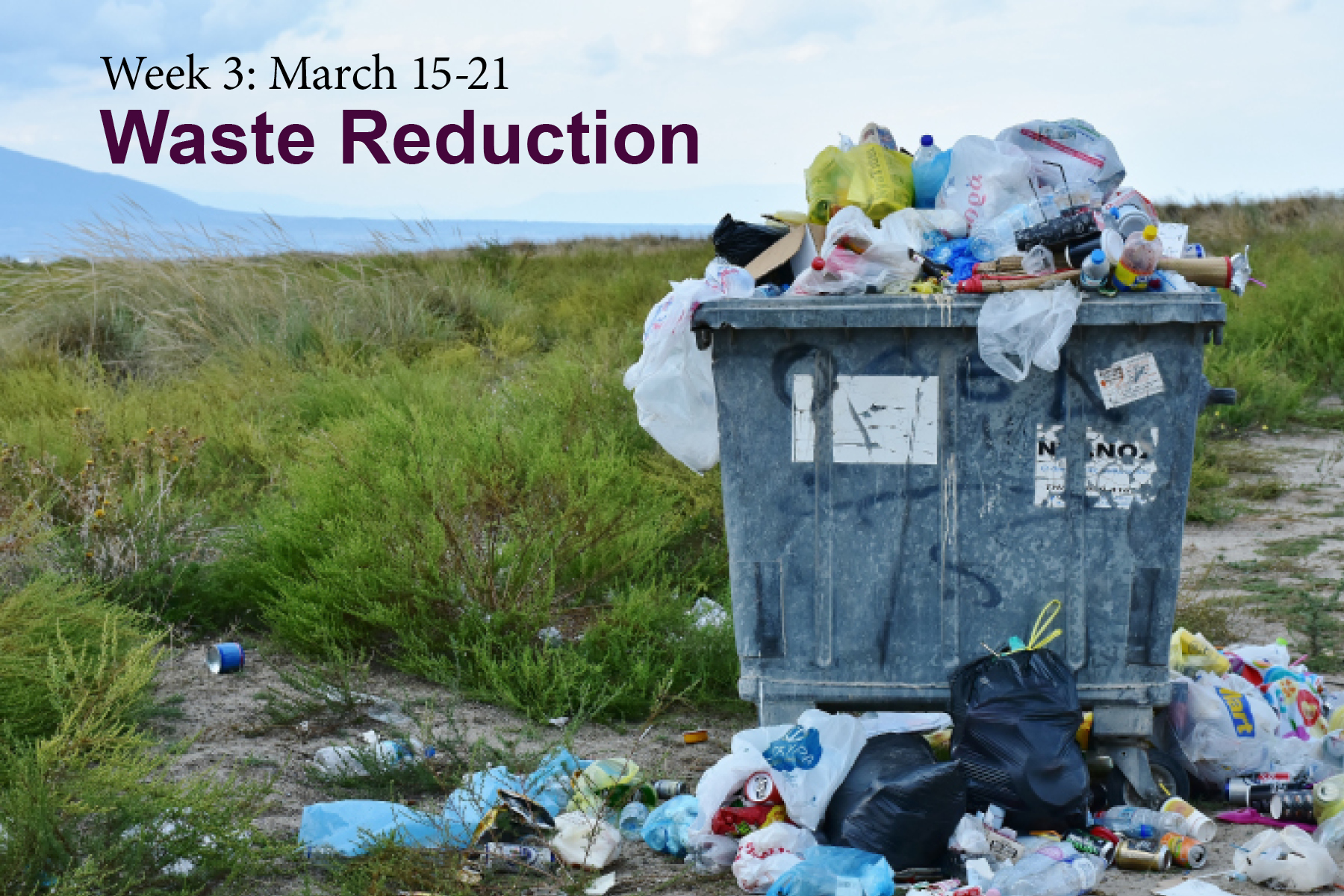
“What kind of world do we want to leave for those who come after us, to children, who are now growing up…Leaving an inhabitable planet is first and foremost up to us.” (Laudato Sí, 160)
The United States, along with most other developed countries, has a serious waste problem. Natural resources are continually extracted to produce goods that are used in the U.S., often only briefly, before they are thrown into landfills, incinerators, or the natural environment. This system of consumption and disposal results in the waste of valuable resources and creates pollution that threatens our health, the environment, and the global climate.
Think of the astronomical number of cardboard boxes used to deliver things or the number of disposable plastic water bottles that are used/purchased daily as just an example of waste that is generated. Certainly, our challenge is to produce less waste: The average American produces 1,704 pounds of garbage per year, which is roughly three times the global average. In fact, the U.S. represents just 4% of the world’s population, but produces 12% of global municipal solid waste.
Throwing something “away” has been part of our culture for generations, and it’s easy to think of things as actually going “away." But the unfortunate reality is that there is no “away.”. Trash sits in a landfill and does not decompose; trash that is burned becomes ash, produces fumes and harms our air; and trash that ends up in waterways unleashes a whole host of environmental problems. None of this is sustainable.
It’s easy to become overwhelmed at the sheer volume of what gets thrown away daily in this country. However, a way to begin to make a difference is to “think global, but act local.” We can recognize the huge worldwide problem of excessive waste production, but take steps in our own homes to reduce the trash that we as an individual or a family produce daily. Those small steps/efforts add up, especially when more and more people start making the effort. Recycling, composting, buying things with less packaging, and simply buying less to begin with are all actions that can have a significant impact on our waste reduction. You’d be surprised at the number of things we can do that will not only help the environment, but will also save you money!
Pray/Learn:
Print this copy of the Prayer for an End to Waste to pray during Lent.
The Ohio EPA provides variety of resources about waste and carbon footprint reduction, zero waste, and other related topics
This LA Times story gives information on how waste impacts poorer, less developed countries.
Do biodegradable items degrade in landfills? These are some things you should know about the landfill process.
The Coastal Care website has information about ocean plastic pollution.
Fast/Change
Some things you can do:
- Make an effort to re-use. Challenge yourself to go one full week without buying anything new. Buy at goodwill or other outlets for used goods/items.
- Donate still-usable items that you no longer need, or have room for rather than throwing things out.
- Take reusable shopping bags with you to the grocery store.
- Buy items/food with less disposable packaging and resolve to serve meals on real plates, using real silverware and glasses/cups. Take a “no disposables” pledge for a week; bring your own coffee cup to coffee hour.
- Go “thrift shopping” instead of buying new.
- Start a compost bin to reduce your food waste.
- Resolve not to use or buy water in single serve/disposable plastic bottles; use a water filter pitcher instead.
Give/Volunteer
Many organizations sponsor litter/trash/waterway cleanups in April as part of “Earth Day” activities. Some examples are Partners for Clean Streams and the Western Lake Erie chapter of the Sierra Club.
The BGSU Office of Campus Sustainability can also help make connections to active environmental-related service projects in the community.
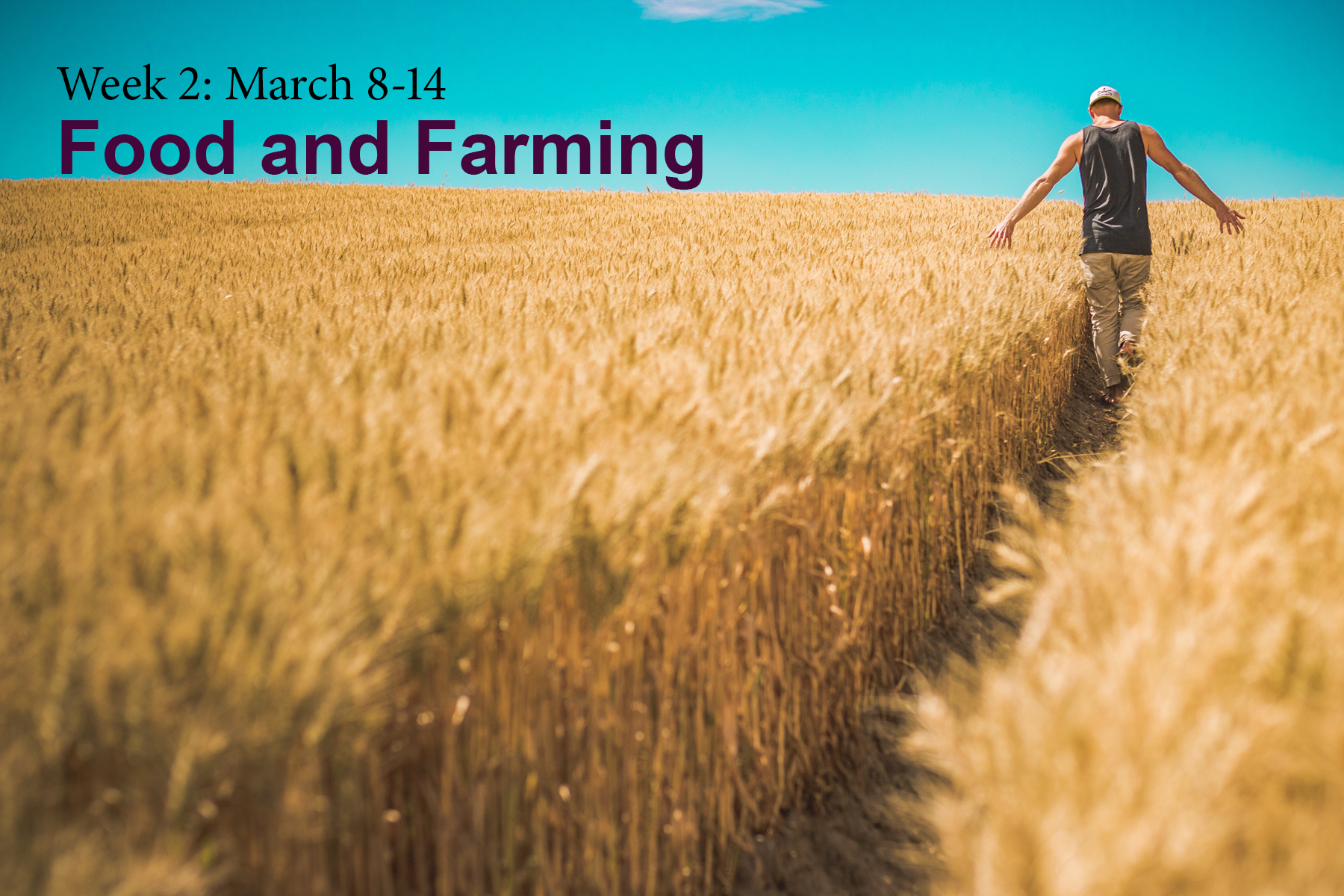
“Whether believers or not, we agreed today that the earth is essentially a shared inheritance whose fruits are meant to benefit everyone.” (Laudato Sí, 93)
We are aware of hunger in many places including our own community. We learn about healthy foods and enjoy a safe food production and delivery system in this country. But do we know where our food comes from and how much it really costs to move from the farm to our fork? How do we access, consume and waste foods that are in short supply and what do we understand about “eating lower on the food chain”? How might research into plant protein change the way we eat? The answers to these questions may have a dramatic effect on farmers in our own community.
“A historic flood in March 2019 left much of America’s heartland under water. Particularly hard hit were Midwestern grain farmers, and climate experts say storms of increasing intensity could be the new normal,” CBS News reported in July. Our own area of Wood County, which is 73% farmland, also was hard hit with rains during planting and harvesting times for the past two years. “Ohio 75,000 farms produce the food and fiber used by nearly 1200 food processors to create the products found on table across the country and the world,” according to USDA statistics. This is an industry already struggling to bounce back from the Chinese trade was and must now grapple with the realities of climate change that threaten to alter the future of farming forever.
Pray/Learn
For more about the historic flood, view this 23-minute video from CBS News on YouTube titled “A Climate Reckoning in the Heartland.”
Inside Climate News, which is a Pulitzer Prize-winning, non-profit, non-partisan news organization dedicated to covering climate change, energy and the environment, has a section dedicated to Agriculture.
Learn more about Farm to Table initiatives in our area. This article from Ohio Magazine profiles three families, including St. John XXIII parishioners Tony and Michelle Weber, who live in Wayne.
Talk to a farmer in your family, our parish or the community.
Fast/Change
Consider a weekly menu that includes Meatless Mondays along with Fish Fry-days during Lent and beyond.
Buy fair trade coffee and chocolate to help agricultural cooperatives that grow these products adapt to and mitigate climate change on their farms. The organization Fairtrade America has helpful information.
Plant your own Climate Victory garden and support your local farmers market.
Give/Volunteer
Once a month, volunteers from St. Aloysius prepare food and staff the soup kitchen of the Helping Hands of St. Louis outreach program of the Diocese of Toledo Catholic Charities. Contact Deb Feehan, via the Parish Office, is you want to volunteer.
Heifer International is a non-profit dedicated to ending hunger and poverty in a sustainable way.
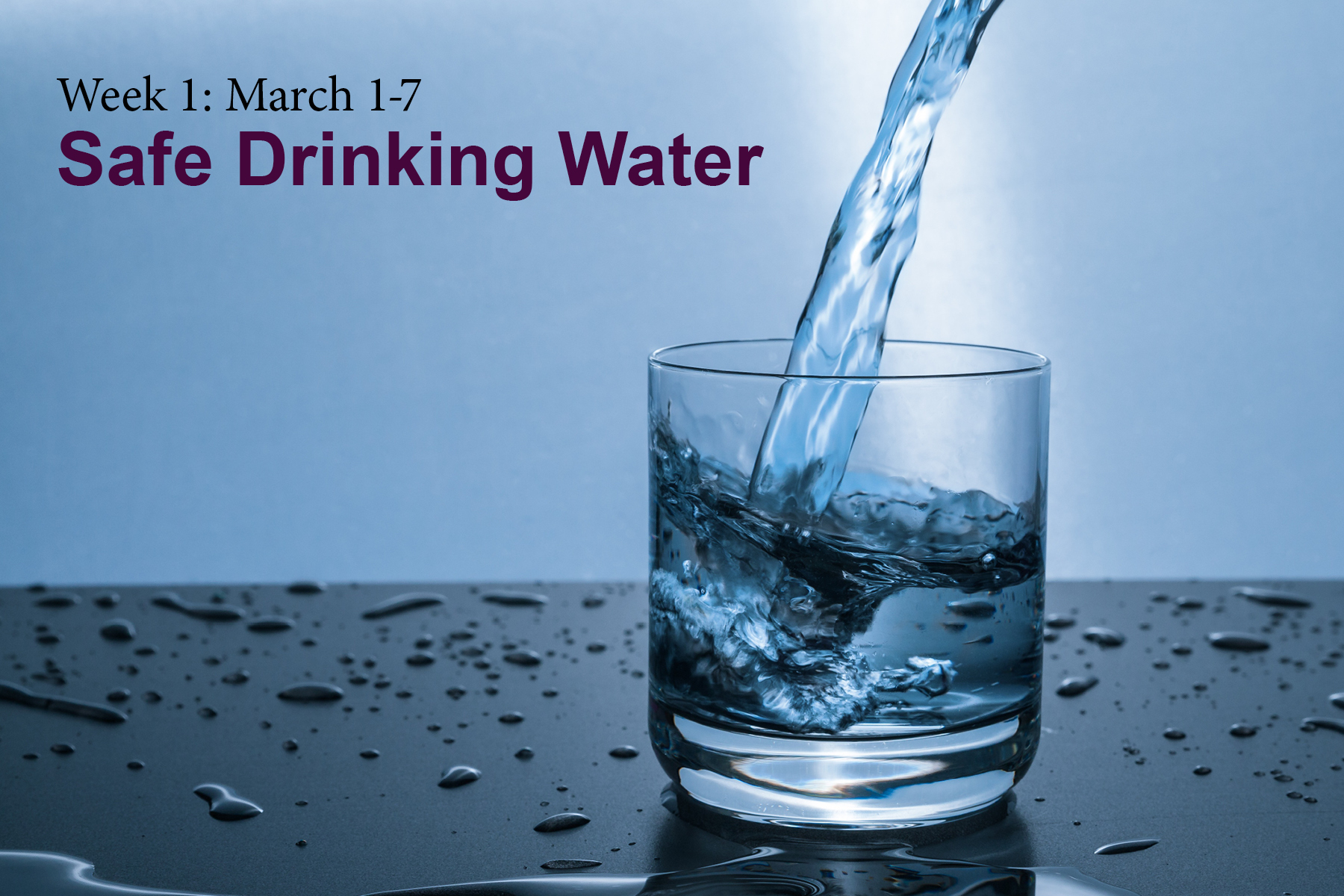
“Local individuals and groups can make a real difference. They are able to instill a greater sense of responsibility, a strong sense of community, a readiness to protect others, a spirit of creativity and a deep love for the land.” (Laudato Sí, 179)
In the United States most of us take the clean, safe water flowing from our faucets and fountains for granted. But even here in America, we can’t always count on that basic human need being met. Remember the Lake Erie/Toledo Water Crisis in 2014 and the Flint Water Crisis just 2 years ago? Different causes, but the same reaction to shortage that resulted in panic, and rethinking about how our utilities are protected and managed in this country. When we have safe water we should consider NOT buying bottled water; it’s unnecessary and leaves a wasted plastic bottle to dispose.
But what if you don’t live in a place with affordable, accessible AND safe water? The World Health Organization reported that in 2017, only 71% of the global population (5.3 billion people) had access to a safely managed drinking water service; one that is located on the premises, available when needed and free from contamination. In the United States we enjoy the world’s most reliable and safe water supplies, but nearly 1.6 million people don’t have indoor plumbing. The lack of sewage disposal leads to contamination of their wells and stream water. Some regions are experiencing weather patterns, storms, flooding and drought that threaten safe and abundant water.
Water crises have multiple causes including pollution, overuse, waste, drought, conflict and restriction by governments. While we’ve been making progress with access to safe water in most poor countries, climate disruptions will continue to place strain on water sources that are affected by drought and overuse.
Pray/Learn
As we pray for people who don’t have safe and abundant water, we can learn ways to conserve our own water use and reduce our “thirst” for consumer products that consume lots of water to produce. World Vision has a comprehensive website with information on a wide variety of topics including hunger, immigration, disease and disaster relief, but we’ll direct you to their report “From the Field” on the global water crises.
World Water Reserve has a directory of organizations that are making a difference.
Fast/Change
Resolve not to use or buy single serve plastic bottled water. Consider taking a refillable water container for road trips and at the gym. Install low flow showers and toilets and practice other water conservation habits in your home, office and school with suggestions from Partners for Clean Streams, a local watershed organizations that is dedicated to the health of the streams and rivers of the Toledo region and the people who use them. This guide from Eartheasy gives you 45 ways to conserve water in your home and yard.
Give/Volunteer
Change lives and create hope by providing clean drinking water to families worldwide. You can donate to the Filter of Hope group, whose members are distributing 400 Filter of Hope kits this week in rural Honduras.
Water Mission is another worldwide organization working to provide safe water.
For a downloadable printable PDF version of Week 1: Safe Drinking Water: CLICK HERE
Ash Wednesday: Feb. 26-29
Theme: Laudato Sì
Theme: Laudato Sì
The encyclical letter Laudato Sì, “Praised Be,” by Pope Francis is the most comprehensive Vatican document to date on environmentalism, ethics, and Christian faith. The document is intended for all people, not Catholics or Christians alone.
PRAY/LEARN
Read a summary of Pope Francis’ Encyclical Laudato Sì.
Read excerpts from the encyclical with key guiding questions to think about.
FAST/CHANGE
Get a plant to care for during Lent as you learn more about nature and environment around you. Plan a family outing to explore a city park or natural area near you.
GIVE/VOLUNTEER
Explore the websites Charity Navigator or GuideStar to learn which charities and non-profit organizations use your donation most effectively. This Lent we’d like you to consider a new charity that works to alleviate suffering of peoples, wildlife habitats or livelihoods that are challenged by climate disruptions. We are always encouraged to help those who are least among us and are most affected by lack of basic human needs.
For a downloadable printable PDF version of this introduction to Living a Laduato Sì Lent: CLICK HERE
